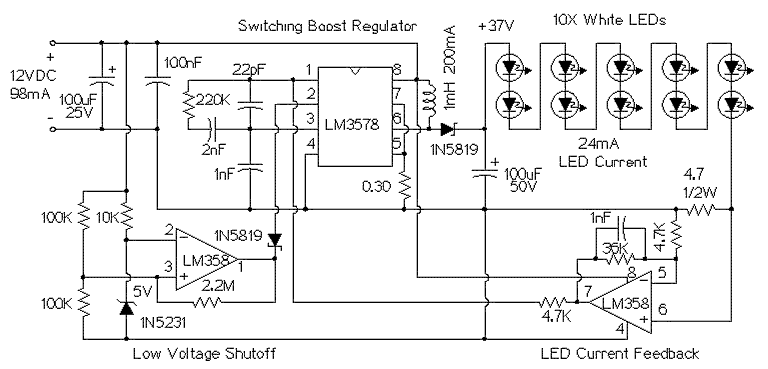Introduction
DC powered LED lighting circuits can vary from trivial single LED/series resistor combos to simple analog current regulators to more complicated switching power supply circuits such as this project. There is a tradeoff between simplicity and circuit capabilities. This more complex circuit adds features such as regulated light level across a wide range of input voltages and automatic circuit shutoff on low input voltage. By using a high frequency switching regulator, the power loss associated with the current dropping resistors found in simpler circuits is reduced. This offsets the power consumed by the circuit's active parts. This circuit can power 10 white LEDs at 24mA of current with only 98mA of input supply current when running on 12V. LED intensity is fully regulated across the entire operating voltage range.

This circuit was inspired by F. Garcia's IR LED video illumination circuit, published in the July 2001 edition of Nuts and Volts magazine. I modified the LED count and feedback circuit, and added the important low voltage shutdown feature.
Specifications
|
||||||||
Theory
The heart of the circuit is a string of 10 white LEDs. These are wired in series and connected to a current-regulated step-up switching power supply circuit.

The LM3578 switching regulator and its associated inductor, 1N5819 schottky diode, and 100uF 50V capacitor step the 12V power supply up to a higher DC voltage. The voltage is approximately 3.7 × the number of LEDs. The 4.7 ohm resistor on the cathode end of the LED string develops a voltage that is proportional to the current through the LEDs. This voltage is amplified by half of the LM358 op-amp and sends a negative feedback signal through a 4.7K resistor back to the LM3578. The 36K feedback resistor across the LM358 sets the LED series current to approximately 24mA. Not all general purpose op-amps will work in this circuit, the LM358 can operate from a single-rail power supply with both input pins near 0V.
The other half of the LM358 (pins 1,2,3) is wired as a 10V voltage comparator. The 1N5231 zener diode and 10K series resistor produces a steady 5V on pin 2 of the LM358. The two 100K resistors on pin 3 of the LM358 divide the input voltage in half. If the supply voltage drops below 10V, the output of the LM358 drops, and pulls pin 2 of the LM3578 down through a 1N5819 schottky diode, causing the LM3578 to shut down. A schottky diode is used instead of a standard silicon diode in order for the LM3578 pin 2 voltage to go low enough to disable the circuit. Without the low voltage shutdown circuit, the LM3578 current will increase as the supply voltage decreases until the IC self-destructs.
The 2.2M resistor across the LM358 produces a hysteresis effect for the low voltage shutoff. The circuit turns off about .25V below where it turns back on, this prevents oscillation around the shutoff threshold. Below the low voltage shutoff point, the circuit will consume about 5mA of current.
An interesting characteristic of this circuit is that it acts as a negative resistance at the power supply terminals. As the supply voltage is increased, the current will drop. The total power consumption stays nearly even across changing input voltage conditions.
Use
Just connect the circuit to a 12V DC power supply, such as a solar charged lead acid battery. The light level will remain constant through the battery voltage change, and the circuit will consume a minimal amount of power.
It is possible to vary the number of white LEDs in this circuit from 8 to 12, as the LED count goes up, so does the regulator's output voltage and input current. Numerous readers have asked me if this circuit can drive more than 12 3.7V white LEDs, 12 white LEDs is about the maximum upper power limit for the LM3578 IC. If you are driving lower voltage LEDs such as 1.4V IR or red parts, the series string can have up to 30 LEDs.
Parts
|
1 |
LM3578AN switch-mode voltage regulator IC |
|
1 |
LM358P dual op-amp |
|
1 |
1N5231 5V zener diode |
|
2 |
1N5819 schottky diodes |
|
10 |
high intensity white LEDs |
|
1 |
100uF 25V electrolytic capacitor |
|
1 |
100uF 50V electrolytic capacitor |
|
1 |
100nF 50V ceramic or MLCC capacitors |
|
1 |
2nF 50V ceramic or MLCC capacitor |
|
2 |
1nF 50V ceramic or MLCC capacitors |
|
1 |
22pF ceramic disc capacitor |
|
1 |
0.3 ohm 1/4 W resistor |
|
1 |
4.7 ohm 1/2W resistor |
|
2 |
4.7K 1/4W resistors |
|
1 |
10K 1/4W resistor |
|
1 |
36K 1/4W resistor |
|
2 |
100K 1/4W resistors |
|
1 |
220K 1/4W resistor |
|
1 |
2.2M 1/4W resistor |
|
1 |
1mH 200mA switching power supply inductor |
|
Inductors that are known to work: |
|
|
Mouser part 851-CDRH74NP-102MC (Sumida SMD) |
